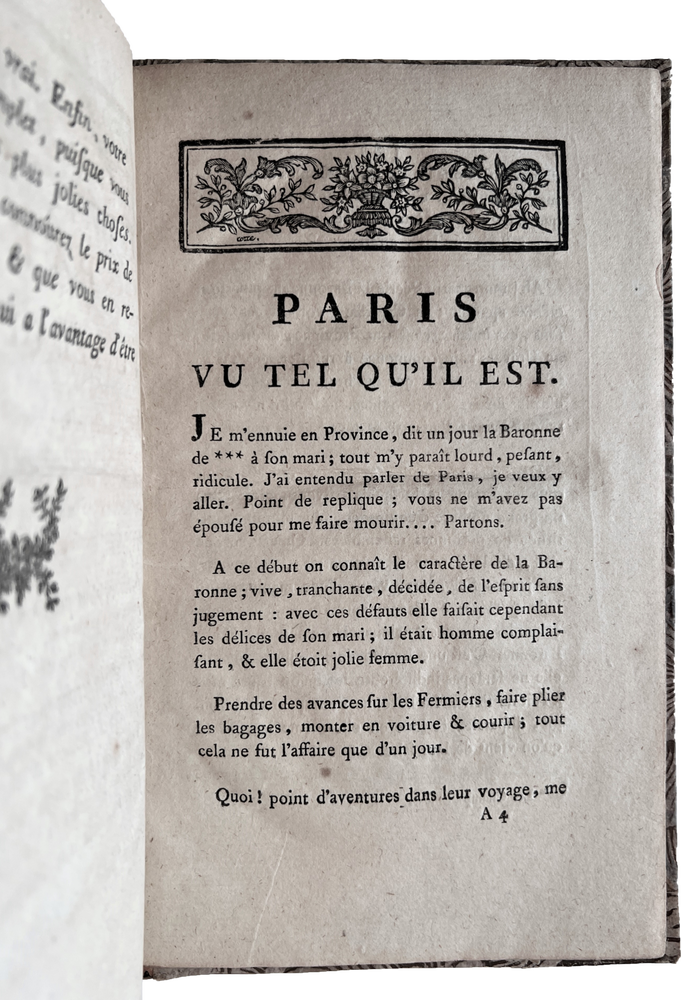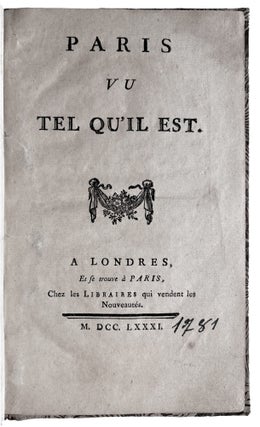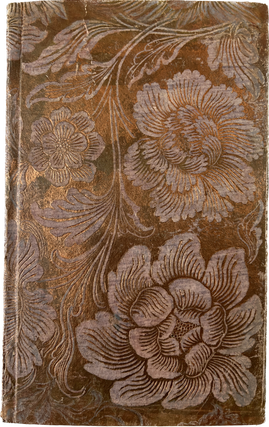Paris vu tel qu’il est. Paris (”A Londres, et se trouve à Paris, chez les Libraires qui vendent les nouveautés”), 1781.
8vo (200 x 122 mm). Collation: A-B8 (-A1, probably the half-title). [3-5] 6-31 pages. Woodcut title vignette, tailpiece, and headpiece signed Cotte. A trifle discolored, “1781” in later ink on title. Formerly stab-stitched and folded horizontally; bound in later boards covered in old Dutch-gilt paper. ***
A bitingly funny satire of the shallowness of privileged urban life during the last years of the ancien régime, one of at least two (and probably more) editions published in 1781. This account of a noble provincial couple’s holiday in Paris relates their exciting (for Madame) and disillusioning (for Monsieur) plunge into the corrupt morals of Parisian society. Madame la Baronesse delightedly embraces all that is au courant: cosmetics, fashion, addressing her husband as Monsieur, sleeping apart (from him), post-midnight parties, adultery, and, eventually, absconding with another (to Bordeaux!)
The anonymous author paints vivid portraits in few words. The Baroness is “lively, sharp, decisive, witty but not judicious; in spite of these flaws her husband adored her; he was an indulgent man, and she was a pretty woman.” Contrasting the spouses, the author evokes their divergent experiences: she can finally breathe in Paris, he sees only fog, and bad air. The tone is light, the arrows swift. The Baron’s cousin, the Chevalier Dorimont (her tour-guide into debauchery), is a con artist and gigolo, “skilled, like many others, at living at the expense of the public.” Several other characters are clearly modeled on known Parisian personages (one appears to be Lavoisier, portrayed as a chemist scorned by academe but beloved to ladies and prelates). Ahead of its time stylistically, written largely in dialogue, this short story provides more fodder for the eternal urban-rural debate — whether to be bored but pure in the countryside, or lead interesting lives in Sodom — while illuminating the relative satisfactions, or lack of them, of the dominant sex and the one that was forced to play second fiddle. The author mocks Americans, who spend their six-month visits to Paris glued to their windows gawking “like monkeys,” the Foire Saint Germain, center of commerce and diversion, of “witty marionettes, eloquent baladins (street performers), decoupled acrobats, rare and industrious animals,” Wauxhall, a chic party venue, the Opera (”Italian throats grafted onto French throats”), where the audience, dressed incognito, prefers viewing each other to the performance, the Comédie Italienne, where the Baron is shocked by the frivolity of the play, and the Comédie Française, where the audience weeps and the Baron is bored. Everywhere one goes only to see and be seen, and the worst is the grand dinner held by a Fermier Général (tax collector): “grande toilette, poudres, essences, blanc, rouge, rien n’est oublié” (Evening dress, powders, perfumes, white, rouge, nothing is forgotten) ... “Disdainful airs, shrugging of shoulders, ceremonial grimaces, pirouettes, strutting conceit ... They praised the beauty of the service without seeing it, picked at their food, drank the wine without tasting it,” and strained to outdo each other for cleverness.
In the dedicatory Epistle to his book, the author promises that it will have readers, though it won’t be found in libraries: instead it will circulate in dressing rooms, surrounded by pompons, flowers and perfumes. In fact the pamphlet must have been popular, as at least one other edition is recorded (though not differentiated by library catalogues), and it was plagiarized by another unidentified writer 30 years later, in a longer work titled Il n’y a qu’un Paris dans le monde (Paris: Mathiot, 1813).
Like this copy, the digitized BnF copy lacks the first leaf, either blank or a half-title (a different 1781 edition, at the Bibl. Ste-Geneviève, has a half-title). I locate 6 institutional copies (editions not clear), of which 2 outside France (Augsburg and Queens Univ. Library, Ontario).
Lacombe, Bibliographie Parisienne, no. 238. Not in Barbier or Gay-Lemonnyer. Item #4228
No longer available



